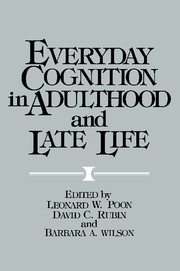Book contents
- Frontmatter
- Contents
- List of contributors
- Preface
- Part I Adult cognitive abilities in the laboratory and in real-life settings: Basic theoretical and methodological issues
- Part IA Systematic approaches to laboratory and real-world research
- Part IB Combining laboratory and real-world research
- 6 The laboratory and ecology: Supplementary sources of data for memory research
- 7 Issues of regularity and control: Confessions of a regularity freak
- 8 Finding the bloody horse
- 9 Some bad and some good reasons for studying memory and cognition in the wild
- Part II Cognition in adulthood and late life: Findings in real-life settings
- Part IIA Everyday cognitive abilities
- Part IIB Concomitant influences
- Part III Cognitive enhancement and aging: Clinical and educational applications
- Part IIIA Issues and perspectives
- Part IIIB Enhancement approaches
- Part IIIC Designing programs for cognitive rehabilitation
- Subject index
- Author index
7 - Issues of regularity and control: Confessions of a regularity freak
Published online by Cambridge University Press: 05 October 2013
- Frontmatter
- Contents
- List of contributors
- Preface
- Part I Adult cognitive abilities in the laboratory and in real-life settings: Basic theoretical and methodological issues
- Part IA Systematic approaches to laboratory and real-world research
- Part IB Combining laboratory and real-world research
- 6 The laboratory and ecology: Supplementary sources of data for memory research
- 7 Issues of regularity and control: Confessions of a regularity freak
- 8 Finding the bloody horse
- 9 Some bad and some good reasons for studying memory and cognition in the wild
- Part II Cognition in adulthood and late life: Findings in real-life settings
- Part IIA Everyday cognitive abilities
- Part IIB Concomitant influences
- Part III Cognitive enhancement and aging: Clinical and educational applications
- Part IIIA Issues and perspectives
- Part IIIB Enhancement approaches
- Part IIIC Designing programs for cognitive rehabilitation
- Subject index
- Author index
Summary
The laboratory offers a high degree of experimental control. That is why laboratories were devised in the first place, and that is why scientists often forsake real-world problems to enter them. This chapter is an argument that, given our present state of knowledge, control is more often a vice than a virtue. It is not experimental control that is now desirable, but rather regularity of results. The time for control will come, but psychology entered the laboratory too quickly. Psychology must first spend time observing and quantifying behavior in its fuller state of complexity. This chapter describes the rationale for this approach, followed by examples of research that has applied it to the topic of human memory.
The best way to start arguing for a flight from the laboratory in the area of memory research is to examine how we entered the laboratory in the first place. Ebbinghaus (1885/1964), in arguing that human memory could be studied in a scientific fashion, provided as clear a definition of the experimental method as exists in the psychological literature. In a section titled “The Method of Natural Science,” he writes as follows:
We all know of what this method consists: an attempt is made to keep constant the mass of conditions which have proven themselves causally connected with a certain result; one of these conditions is isolated from the rest and varied in a way that can be numerically described; then the accompanying change on the side of the effect is ascertained by measurement or computation.
(Ebbinghaus, 1885/1964, p. 7)- Type
- Chapter
- Information
- Everyday Cognition in Adulthood and Late Life , pp. 84 - 103Publisher: Cambridge University PressPrint publication year: 1989
- 5
- Cited by



